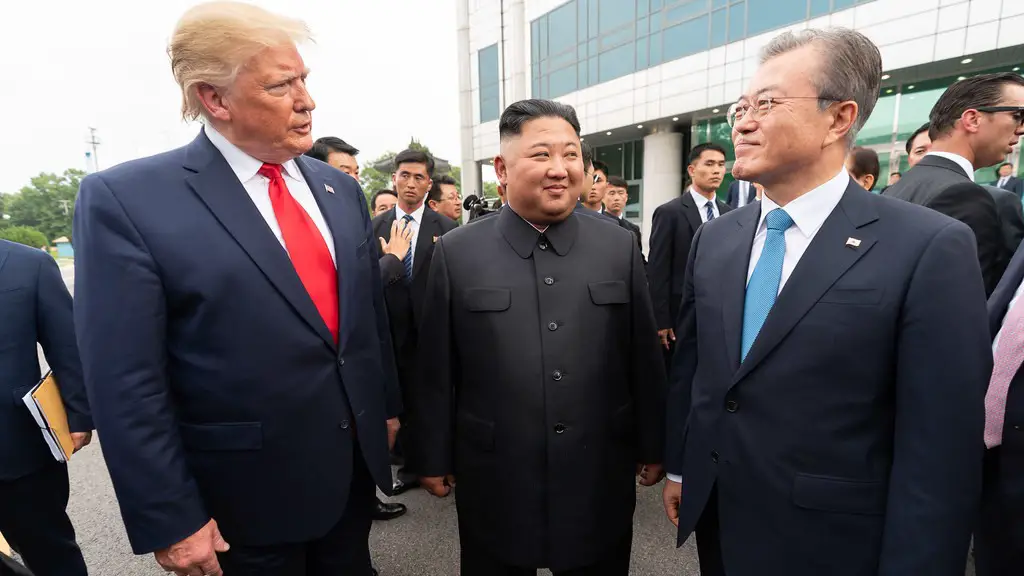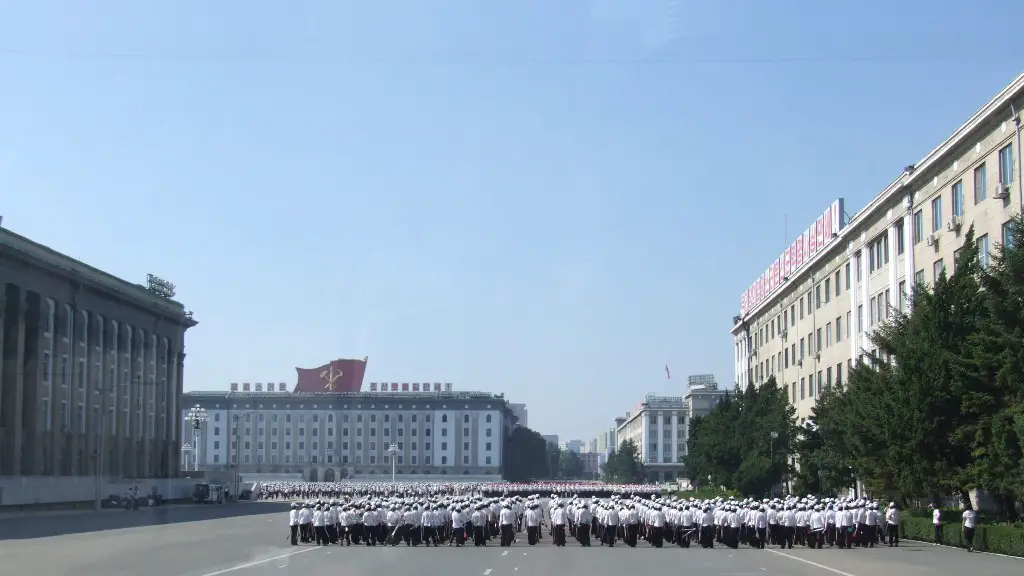Historical Background of North Korea
North Korea has been claiming a hard line stance and making extreme threats for a long time. In 1950, North Korea started a military campaign against South Korea that later turned into a full-fledged war. The war culminated in 1953, resulting in the establishment of a de facto border between the two states, along the 38th parallel. Following the military confrontation, North Korea announced its intentions of reuniting the two Koreas as a single state. For years since, tensions between the two nations have been continuously high and there were repeated skirmishes and hostile rhetoric.
In the 1970s, North Korea began to pursue a policy of self-reliance known as Juche, and this further isolated the country from the international community. A defining moment was the North Korean invasion of South Korea in January 1968, when the North attempted to infiltrate a team of commandos into South Korea. The mission failed spectacularly and the ensuing ‘Ax Murder Incident’ further increased tensions in the region.
Another significant incident that increased tensions in the region was North Korea’s pursuit of nuclear weapons. In spite of numerous international sanctions, North Korea has been able to develop a nuclear weapons program and is now estimated to possess up to 60 nuclear warheads. This has led to concerns that North Korea may use these weapons in a conflict with South Korea or any other country.
North Korean Leader’s Role in Making Threats
The current leader of North Korea, Kim Jong-un, has taken a hard line stance in recent years, and is believed to be directly responsible for the escalation in tensions between North Korea and the international community. The rhetoric and violent language used by the North Korean leadership has been viewed as provocative and threatening by other countries and has raised alarm bells throughout the region. Kim Jong-un’s aggressive stance has been seen as a deliberate attempt to deter any potential military action against North Korea.
Furthermore, Kim Jong-un has increased the North Korean military’s budget significantly, and is believed to have encouraged the production of weapons of mass destruction. This military build-up has been a major contributing factor to the current hostile environment between North Korea and its neighboring countries, and is seen as a deliberate strategy by Kim Jong-un to heighten threats against potential enemies.
Kim Jong-un is also believed to have fuelled the hostile rhetoric as a way of controlling dissent among the North Korean population, by painting the US and its allies as enemies of the state. This strategy appears to have been successful, with the vast majority of North Koreans adopting an ultra-nationalist stance and rallying behind Kim Jong-un and his aggressive foreign policy.
North Korean Fears of US and its Allies
In addition to Kim Jong-un’s aggressive policies, it is believed that North Korea’s threats are motivated by fear of the US and its allies. North Korea has long been concerned about the US and its military presence in the region, and it is believed that the North Korean leadership views the US as a potential aggressor that must be deterred.
US-led interventions in neighbouring countries such as Iraq and Afghanistan have also heightened North Korean suspicions of American intentions in the region, which has led to further saber-rattling from the North Korean government. North Korea is also believed to be concerned about potential regime change efforts, which would threaten its own political system.
Furthermore, North Korea has been alarmed by the military buildup of its neighbours, such as South Korea and Japan. In recent years, South Korea and Japan have significantly increased their military capabilities, and the North Korean leadership has become increasingly suspicious of their intentions. This has been compounded by the US’s decision to deploy its missile defence system in South Korea, further heightening tensions in the region.
International Sanctions and Their Effects on North Korea
The international community has imposed economic sanctions on North Korea in an attempt to persuade it to abandon its nuclear weapons program. These sanctions have had some impact, with North Korea’s economy suffering and the country experiencing increasing levels of poverty. This has resulted in increased dissatisfaction among the North Korean population, and further motivated the leadership to make threats as a way of deflecting attention away from the plight of its people.
The sanctions have also led to an increase in the black market activity in the country, as many people have resorted to buying and selling goods on the black market in order to make a living. This has progressed to a point where North Korea is now believed to be supplying arms and other military equipment to terrorist organisations. This is also seen as an attempt by the North Korean leadership to deflect attention away from its oppressive regime and boost its standing in the eyes of the international community.
Despite the impact of the sanctions, North Korea continues to defy international pressure and refuses to abandon its nuclear weapons program. This has created an increasingly tense situation in the region, with North Korea continuing to make threats and saber-rattling becoming increasingly common.
North Korea’s Military Capabilities and Their Impact
Over the years, North Korea has significantly increased its military capabilities and is now estimated to possess up to 60 nuclear warheads. These weapons are believed to be capable of reaching other parts of east Asia, such as South Korea, China, and Japan. This has caused fear and alarm among these countries, as well as concern in the US and other western countries.
In addition to nuclear weapons, North Korea is also believed to possess biological and chemical weapons, as well as long-range ballistic missiles capable of delivering these weapons. This has resulted in further isolation of the country, as the international community has become increasingly concerned about the security threat posed by North Korea.
The military buildup by North Korea has further increased tensions in the region and the US and other countries have responded with increased military presence on their borders. This has been seen as a deliberate attempt by North Korea to deter any potential military action against them and to demonstrate their military strength.
Significance of North Korea’s Actions
North Korea’s threats and military provocations have raised alarm bells among the international community and it is now seen as one of the most serious security threats facing the world today. This is due to North Korea’s possession of nuclear weapons and its willingness to use them if provoked, as well as its refusal to abide by international sanctions and its aggressive rhetoric.
Furthermore, North Korea’s actions have destabilised the region and resulted in increased tensions among its neighbours. This has resulted in an arms race among the countries in the region, as each country seeks to build up its military capabilities in an attempt to match or exceed the strength of North Korea.
In addition, North Korea’s aggressive stance has been used as a pretext by some countries to further their own agendas, such as Japan’s recent decision to increase its military capabilities and further militarize the country. This has further exacerbated tensions between North Korea and its neighbours and raised the danger of a potential military conflict.
North Korea’s Relations with Other Countries
In spite of its aggressive posturing, North Korea does maintain diplomatic relations with other countries and has attempted to normalise its relations with some of its neighbouring countries. This has been seen as a positive step towards improving the security situation in the region. However, North Korea’s relations with the US and other countries have deteriorated in recent years, and North Korea is now viewed as a pariah state in the eyes of the international community.
North Korea’s relations with China have also become increasingly strained in recent years, with China finding itself in a difficult position as it seeks to both maintain its relationship with North Korea, while also trying to manage US-China relations. This has resulted in increased tension between the two countries, and the situation is further complicated by the presence of US military forces in the region.
In addition, North Korea has attempted to improve its relations with other countries in the region, such as South Korea and Japan. Due to the history of mistrust between the two countries, however, it is unlikely that North Korea will be able to normalise its relations with its neighbours anytime soon.
International Efforts to Address North Korea’s Threats
In response to North Korea’s provocations and threats, the international community has sought to address the issue through diplomacy, economic sanctions, and arms control negotiations. Diplomatic efforts have been largely unsuccessful, as North Korea has proven unwilling to engage in meaningful dialogue with other countries. Economic sanctions have been more successful, however, with North Korea’s economy suffering as a result of the sanctions and its people facing increasing levels of poverty.
Arms control negotiations have been less successful, however, with North Korea continuing to defy international pressure and refuse to abandon its nuclear weapons program. This has created an increasingly tense situation, and there are now increasing concerns that North Korea may use these weapons in a conflict with South Korea or any other country.
In addition, the US has sought to address the issue through a “maximum pressure” campaign, in which it has sought to isolate North Korea and pressure it to abandon its nuclear weapons program. This has been met with resistance by North Korea, and there has been little progress in terms of solving the crisis.
Conclusion
North Korea’s threats and military provocations have created an increasingly tense situation in the region. This has resulted in increased international pressure and economic sanctions, as well as a military buildup by its neighbours. Despite these efforts, North Korea continues to defy international pressure and refuses to abandon its nuclear weapons program. This has resulted in increased fear and alarm in the region, and the international community is now faced with the difficult task of finding a peaceful solution.





